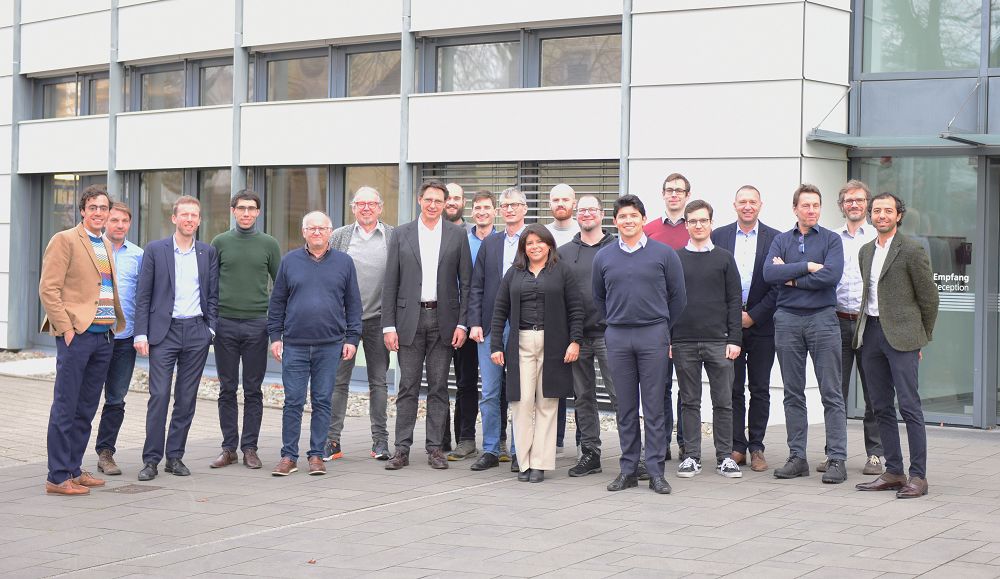| Duration: | 12/2022 - 11/2028 |
| Contracting Authority/ Sponsors: |
Federal Ministry for Digital and Transport (BMDV) |
| Project Partners: |
Associated Partners
|
| Project Focus: |
SAFari - Pilot Plant for Sustainable Aviation Fuels Based on Methanol


In the research project "Sustainable Aviation Fuels based on Advanced Reaction and Process Intensification" (SAFari), a consortium of research institutes and industrial partners under the leadership of the Fraunhofer Institute for Solar Energy Systems ISE will produce and test sustainable kerosene from methanol in a pilot plant. The project is expected to contribute to the full market approval of this methanol-based process route by the American Society for Testing and Materials (ASTM).
This pilot plant for the production of Sustainable Aviation Fuel (SAF) will be designed and operated with all the functionalities required for the subsequent technical processes. It will be equipped in such a way that the feasibility of high-yield methanol-based SAF production in an industrially relevant area can be demonstrated.
Air transport is one of the most important areas in the transport sector for which electrification will not be feasible in the coming decades for longer distances (> 4,000 km) and liquid fuels with high energy density will continue to be needed. A sustainable, synthetic liquid fuel will be required to completely replace fossil kerosene on longer routes in the future, while at the same time the process efficiency of the production of such a fuel will need to be increased. Furthermore, with regard to the methanol pathway for the production of SAF, there is not yet a fully integrated pilot or demonstration plant in operation that encompasses the entire process chain. In addition to Fraunhofer ISE, partners from the entire value chain have joined forces for the project.
Our services:
- Fraunhofer ISE is designing and testing a pilot plant for the production of sustainably produced kerosene from methanol.
- Together with the partners, it is planned to obtain full market approval for the methanol-based, sustainably produced kerosene from the American Society for Testing and Materials (ASTM). So far, only ethanol and isobutanol have been approved as reactants.
- The SAFs currently approved by ASTM allow a blending rate with conventional kerosene of up to 50%.The SAFari project is aiming for a blending rate of up to 100% in the long term.
- The aim is to show that with the synthesis of aviation fuel on the basis of methanol it is possible to reduce hydrogen requirements and increase overall process efficiency. The focus will be on innovative reaction technologies along the various subprocesses and an intelligent integration of materials and energy.
Furthermore, ISE is simulating the potential of expanding the system boundary to include, in addition to the conversion of methanol to SAF, also H2 and CO2 generation facilities.
Our methodology:
In the first step of the 6-year SAFari project, the individual synthesis and separation steps of the intermediate and final products will be carried out on a laboratory scale. This will be accompanied by prescreening, a procedure for the early evaluation and characterization of fuels with regard to product conformity. Once all optimal operating parameters have been experimentally determined, the integrated SAFari process concept will be developed with the support of the process simulation platform. The equipment list for the procurement and construction phases will be drawn up on this basis. The delivery and commissioning of the pilot plant is scheduled for the fourth year of the project, with the aim of supplying the quantities required by ASTM through continuous production and to demonstrate the technological feasibility and reproducibility on an industrially relevant scale. Subsequently, in the last two project years, a techno-economic and ecological evaluation of the SAFari process, the planning of a large-scale plant, a risk analysis, a retrofit analysis, and market entry strategies for the introduction of the technology will be carried out.
The goal:
The SAFari approach can help to completely replace fossil fuel in long-haul air transport and significantly reduce the carbon footprint of aviation fuels in an economically viable way. In addition to the potential to reduce CO2 directly, SAF also offers the possibility to contribute quite significantly to reducing the non-CO2-related climate impact caused by contrails.